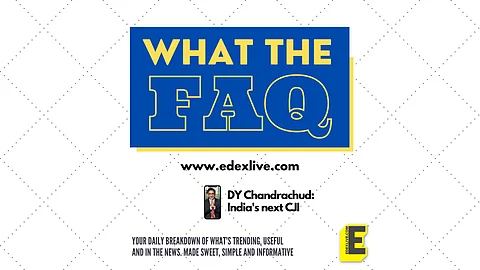

Justice DY Chandrachud is set to take over as the 50th Chief Justice of India following Uday Umesh Lalit who had a brief tenure of 74 days. Justice Chandrachud will serve as the CJI for two years until November 10, 2024. He will be sworn in on November 9.
During his career, he has been a part of some landmark judgments. However, there have been some allegations against his term in office. Today’s FAQ will look into these.
Who was the previous CJI? What key judgments were passed during this brief tenure?
During the brief tenure of CJI UU Lalit, the Supreme Court’s pace at which it heard cases, including pending ones, picked up like never before, according to many netizens. Reports pointed out that within a month of his coming to office in August, five Constitutional benches were formed.
Additionally, each bench had at least 60 to 70 cases listed before it every day. Several important cases such as the legality of the much-debated Citizenship Amendment Act (CAA); paying compensation to Bhopal Gas tragedy victims; the bail plea of Kerala-based journalist Kappan, arrested in October 2020 while on his way to Hathras in Uttar Pradesh, where a young Dalit woman had died after allegedly being gang-raped and more. Additionally, during his tenure, a full court, including all judges of the top court, decided to live-stream constitutional bench proceedings.
What were some of the landmark rulings of Justice Chandrachud’s career?
UU Lalit recommended the name of DY Chandrachud as his successor and set in motion the process of transfer of power. Justice Chandrachud joined the top court in 2016 and has played a pivotal role in delivering important judgments.
Decriminalising Section 377
In a historic ruling that decriminalised Section 377 which called for punishment of any individual who engaged in sexual activity “against the order of nature”, Justice Chandrachud was on the five-judge bench that declared, “that in penalising such sexual conduct, the statutory provision violates the constitutional guarantees of liberty and equality. It denudes members of the LGBT communities of their constitutional right to lead fulfilling lives,” the judgment given by him read, according to reports.
Right to Privacy
On August 14, 2017, Justice Chandrachud upheld the Right to Privacy as a fundamental right and stated that it is an "intrinsic part of Right to Life and Personal Liberty under Article 21 and entire Part III of the Constitution".
Abortion rights
In 2022, a bench comprising Justice Chandrachud and others expanded the scope of those who can seek abortion to include unmarried women between 20-24 weeks of pregnancy under the Medical Termination of Pregnancy (MTP) Act. In fact, the judgment also included persons who are not cisgender women.
Sabarimala Case
A bench comprising Justice Chandrachud and others pronounced a verdict on a bunch of pleas that had challenged the entry of women of menstrual age into the temple in Kerala by ruling that barring their entry would be unconstitutional.
How is his appointment significant? Did he overturn his own father's judgements?
This is also the first time a father and son duo will hold the CJI position in the over seven-decade-long history of the top court. Justice Chandrachud's father, Justice YV Chandrachud, was the 16th and the longest-serving CJI of India. In fact, during Chandrachud’s tenure, he overturned some of his father’s judgments.
In the 2017 privacy verdict, Chandrachud overruled the habeas corpus case that applied during the Emergency period in the country which had held that fundamental rights can be suspended at a time when an emergency is proclaimed. This overruled judgment was passed by a bench with Justice YV Chandrachud.
Additionally, Senior Chandrachud had upheld the validity of Section 497 which criminalised adultery. Whereas his son decriminalised adultery as a punishable offence and noted that the provision was rooted in patriarchal views.
What was the complaint filed against Justice Chandrachud?
A few days ago, a complaint letter accusing Justice Chandrachud of misusing his office was sent to the President of India. The complainant accused him of passing an order that allegedly favoured his son’s (a lawyer’s) client — this particular case in which the order was passed is the one where Justice Chandrachud’s son, Advocate Abhinav Chandrachud appeared in a case for a person named Sagar Surywanshi, who was allegedly the mastermind behind a crime.
The Bar Council of India (BCI) however, was quick in condemning this complaint, stating that it is a “scurrilous and malicious attempt to interfere with the functioning of Judiciary and the administration of Justice.”
